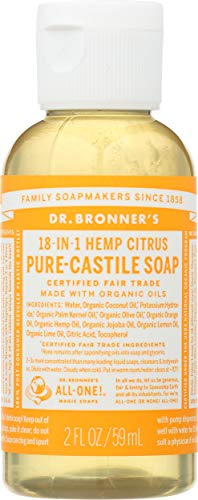
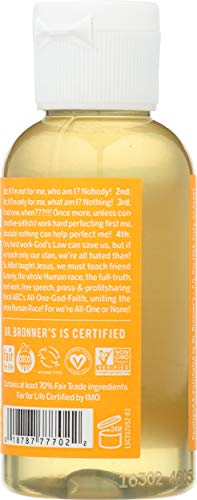
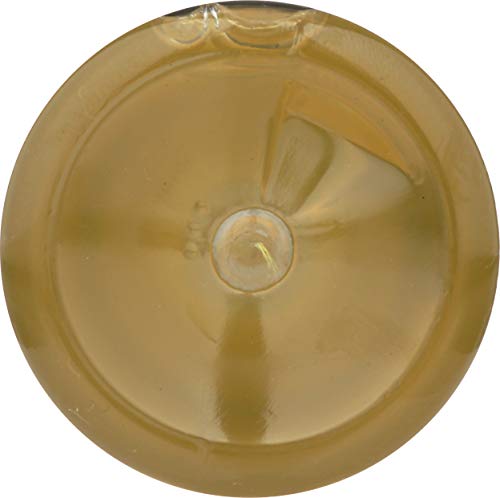
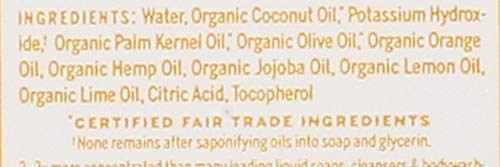
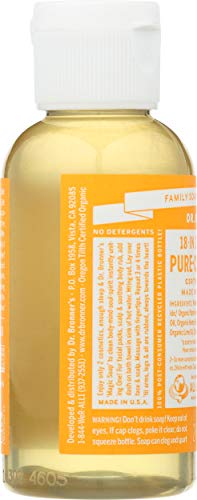
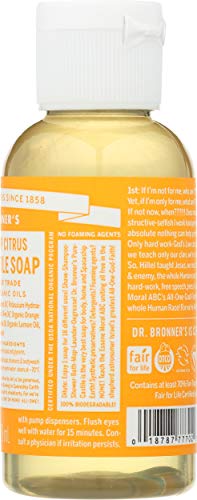
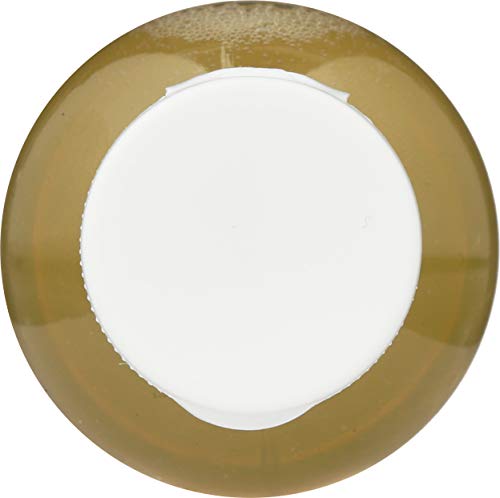
Dr. Bronner's Body Soap - USDA Organic, Non-GMO, Fair Trade, Citrus Scent - 2 fl oz


Potassium Hydroxide
High RiskPotassium hydroxide is a caustic inorganic base commonly used in various products for its ability to adjust pH levels and act as a cleaning agent. It is highly soluble in water and can produce heat upon dissolution, making it effective in certain formulations.
Sustai Insights
Potassium hydroxide serves as a strong pH adjuster and cleaning agent, but it poses significant health risks due to its caustic nature, which can cause irritation to skin and eyes. Environmental concerns include its potential to contribute to water pollution. Regulatory bodies have imposed strict usage restrictions due to these hazards, leading to a high-risk overall assessment. Safe handling practices are essential, and alternatives such as citric acid may provide safer pH adjustment without the associated risks.
Citric Acid
Medium RiskCitric acid is an alpha hydroxy acid used in personal care products primarily for its role as a pH adjuster and natural preservative. It occurs naturally in citrus fruits and is commonly utilized in various formulations for its chelating properties and mild exfoliation benefits.
Sustai Insights
Citric acid offers functional benefits as an effective preservative and pH stabilizer, contributing to product longevity and stability. It is biodegradable and derived from renewable sources. Health risks are low, with minimal concerns regarding carcinogenicity, allergies, and reproductive toxicity. However, moderate use restrictions exist due to potential irritation at high concentrations. Environmental risks are limited, as citric acid is not known to accumulate in ecosystems. Regulatory agencies have no significant advisories against its use. Overall, it is assessed as a medium-risk ingredient, with safe usage practices recommended and alternatives available.
Cocos Nucifera (Coconut) Oil
Low RiskCocos Nucifera (Coconut) Oil is derived from the kernels of the coconut palm. It is primarily used in cosmetic formulations for its emollient and moisturizing properties, making it suitable for skin and hair care products.
Sustai Insights
Coconut oil serves as an effective moisturizer and emollient, promoting skin hydration and softness. It is sustainably sourced and biodegradable. Health risks are minimal, with low concerns regarding carcinogenicity, allergens, and reproductive toxicity. Environmental impact is also low, as it does not contribute significantly to pollution or bioaccumulation. Regulatory bodies have not issued restrictions on its use. Overall, coconut oil presents a low risk for health and environmental concerns, making it a safe ingredient in cosmetic products.
Orange
Low RiskOrange, derived from the fruit of the Citrus sinensis tree, is commonly used in various products for its aromatic properties and as a flavoring agent. It is often employed for its potential to enhance sensory appeal in food and cosmetic formulations.
Sustai Insights
Orange offers functional benefits such as flavor enhancement and fragrance in products. It is generally considered safe with low concerns regarding carcinogenicity, allergies, and reproductive toxicity. Environmental risks are minimal, as it does not significantly contribute to pollution or bioaccumulation. Regulatory bodies have no current restrictions on its use. Overall, orange is assessed to have a low risk profile, making it a viable option in formulations.
Water
Low RiskWater is a clear, colorless liquid essential for various biological processes. It serves as a solvent in formulations, facilitating the dissolution of other ingredients and enhancing product texture and application. Additionally, water plays a crucial role in hydration and is a key component in many cosmetic and personal care products.
Sustai Insights
Water is an effective solvent and hydrator, contributing to the texture and efficacy of formulations. It is biodegradable and generally regarded as safe, with low concerns regarding carcinogenicity, allergies, and reproductive toxicity. However, excessive water usage can lead to environmental concerns, particularly regarding resource depletion. Regulatory bodies do not impose restrictions on water use in cosmetics. Overall, the risks associated with water are low, making it a safe and essential ingredient.
Citrus Limon (Lemon) Peel
Low RiskCitrus limon (lemon) peel is derived from the outer skin of lemons and is commonly used in cosmetic formulations for its aromatic properties and potential skin benefits. It serves primarily as a fragrance agent and may also provide antioxidant effects.
Sustai Insights
Citrus limon (lemon) peel is valued for its aromatic contributions and potential antioxidant properties, which can enhance product appeal. It has a low risk of adverse health effects, including low concerns for carcinogenicity, allergies, and irritation. Environmental risks are minimal, with no significant evidence of bioaccumulation or pollution. Regulatory assessments indicate no restrictions on use. Overall, it is considered low risk, and safe usage practices should be maintained. Alternatives may include other citrus peels or natural fragrance compounds.
Simmondsia Chinensis (Jojoba)
Low RiskSimmondsia chinensis, commonly known as jojoba, is an oil derived from the seeds of the jojoba plant. It is commonly used in cosmetic formulations for its moisturizing properties, acting as an emollient and skin conditioning agent.
Sustai Insights
Jojoba oil offers functional benefits such as effective skin moisturization and is biodegradable, with sustainable sourcing practices. Health risks are low, with minimal concerns regarding carcinogenicity, allergies, and reproductive toxicity. Environmental impact is negligible, with no pollutant or bioaccumulation potential. Regulatory status is favorable with no significant restrictions noted. Overall, it is assessed as low risk, and safe usage practices should be maintained. Alternatives include other plant-derived oils like argan or almond oil, which may provide similar benefits.
Tocopherol, D Alpha
Low RiskTocopherol, specifically d-alpha tocopherol, is a naturally occurring form of Vitamin E. It is commonly used in cosmetic and personal care products primarily for its antioxidant properties, helping to protect formulations from oxidation and extend shelf life.
Sustai Insights
D-alpha tocopherol provides effective antioxidant benefits, contributing to product stability. It is sustainably sourced and generally regarded as safe, with low concerns regarding carcinogenicity, allergies, and reproductive toxicity. However, there are minor concerns about endocrine disruption. Regulatory bodies have not imposed significant restrictions, indicating low overall risk. Recommended usage practices include adhering to established safe concentration thresholds. Alternatives, such as other forms of Vitamin E or plant-based antioxidants, may also be considered.
Cocos Nucifera (Coconut) Oil
Low RiskCocos Nucifera (Coconut) Oil is derived from the kernels of the coconut palm. It is primarily used in cosmetic formulations for its emollient and moisturizing properties, making it suitable for skin and hair care products.
Sustai Insights
Coconut oil serves as an effective moisturizer and emollient, promoting skin hydration and softness. It is sustainably sourced and biodegradable. Health risks are minimal, with low concerns regarding carcinogenicity, allergens, and reproductive toxicity. Environmental impact is also low, as it does not contribute significantly to pollution or bioaccumulation. Regulatory bodies have not issued restrictions on its use. Overall, coconut oil presents a low risk for health and environmental concerns, making it a safe ingredient in cosmetic products.
Orange
Low RiskOrange, derived from the fruit of the Citrus sinensis tree, is commonly used in various products for its aromatic properties and as a flavoring agent. It is often employed for its potential to enhance sensory appeal in food and cosmetic formulations.
Sustai Insights
Orange offers functional benefits such as flavor enhancement and fragrance in products. It is generally considered safe with low concerns regarding carcinogenicity, allergies, and reproductive toxicity. Environmental risks are minimal, as it does not significantly contribute to pollution or bioaccumulation. Regulatory bodies have no current restrictions on its use. Overall, orange is assessed to have a low risk profile, making it a viable option in formulations.
Water
Low RiskWater is a clear, colorless liquid essential for various biological processes. It serves as a solvent in formulations, facilitating the dissolution of other ingredients and enhancing product texture and application. Additionally, water plays a crucial role in hydration and is a key component in many cosmetic and personal care products.
Sustai Insights
Water is an effective solvent and hydrator, contributing to the texture and efficacy of formulations. It is biodegradable and generally regarded as safe, with low concerns regarding carcinogenicity, allergies, and reproductive toxicity. However, excessive water usage can lead to environmental concerns, particularly regarding resource depletion. Regulatory bodies do not impose restrictions on water use in cosmetics. Overall, the risks associated with water are low, making it a safe and essential ingredient.
Potassium Hydroxide
High RiskPotassium hydroxide is a caustic inorganic base commonly used in various products for its ability to adjust pH levels and act as a cleaning agent. It is highly soluble in water and can produce heat upon dissolution, making it effective in certain formulations.
Sustai Insights
Potassium hydroxide serves as a strong pH adjuster and cleaning agent, but it poses significant health risks due to its caustic nature, which can cause irritation to skin and eyes. Environmental concerns include its potential to contribute to water pollution. Regulatory bodies have imposed strict usage restrictions due to these hazards, leading to a high-risk overall assessment. Safe handling practices are essential, and alternatives such as citric acid may provide safer pH adjustment without the associated risks.
Citrus Limon (Lemon) Peel
Low RiskCitrus limon (lemon) peel is derived from the outer skin of lemons and is commonly used in cosmetic formulations for its aromatic properties and potential skin benefits. It serves primarily as a fragrance agent and may also provide antioxidant effects.
Sustai Insights
Citrus limon (lemon) peel is valued for its aromatic contributions and potential antioxidant properties, which can enhance product appeal. It has a low risk of adverse health effects, including low concerns for carcinogenicity, allergies, and irritation. Environmental risks are minimal, with no significant evidence of bioaccumulation or pollution. Regulatory assessments indicate no restrictions on use. Overall, it is considered low risk, and safe usage practices should be maintained. Alternatives may include other citrus peels or natural fragrance compounds.
Simmondsia Chinensis (Jojoba)
Low RiskSimmondsia chinensis, commonly known as jojoba, is an oil derived from the seeds of the jojoba plant. It is commonly used in cosmetic formulations for its moisturizing properties, acting as an emollient and skin conditioning agent.
Sustai Insights
Jojoba oil offers functional benefits such as effective skin moisturization and is biodegradable, with sustainable sourcing practices. Health risks are low, with minimal concerns regarding carcinogenicity, allergies, and reproductive toxicity. Environmental impact is negligible, with no pollutant or bioaccumulation potential. Regulatory status is favorable with no significant restrictions noted. Overall, it is assessed as low risk, and safe usage practices should be maintained. Alternatives include other plant-derived oils like argan or almond oil, which may provide similar benefits.
Citric Acid
Medium RiskCitric acid is an alpha hydroxy acid used in personal care products primarily for its role as a pH adjuster and natural preservative. It occurs naturally in citrus fruits and is commonly utilized in various formulations for its chelating properties and mild exfoliation benefits.
Sustai Insights
Citric acid offers functional benefits as an effective preservative and pH stabilizer, contributing to product longevity and stability. It is biodegradable and derived from renewable sources. Health risks are low, with minimal concerns regarding carcinogenicity, allergies, and reproductive toxicity. However, moderate use restrictions exist due to potential irritation at high concentrations. Environmental risks are limited, as citric acid is not known to accumulate in ecosystems. Regulatory agencies have no significant advisories against its use. Overall, it is assessed as a medium-risk ingredient, with safe usage practices recommended and alternatives available.
Tocopherol, D Alpha
Low RiskTocopherol, specifically d-alpha tocopherol, is a naturally occurring form of Vitamin E. It is commonly used in cosmetic and personal care products primarily for its antioxidant properties, helping to protect formulations from oxidation and extend shelf life.
Sustai Insights
D-alpha tocopherol provides effective antioxidant benefits, contributing to product stability. It is sustainably sourced and generally regarded as safe, with low concerns regarding carcinogenicity, allergies, and reproductive toxicity. However, there are minor concerns about endocrine disruption. Regulatory bodies have not imposed significant restrictions, indicating low overall risk. Recommended usage practices include adhering to established safe concentration thresholds. Alternatives, such as other forms of Vitamin E or plant-based antioxidants, may also be considered.
Experience the refreshing power of Dr. Bronner's Citrus Castile Soap, a versatile body soap made with certified fair trade and USDA organic ingredients. This 2 fl oz bottle is perfect for eco-conscious consumers looking for effective yet gentle cleansing.
- Natural Ingredients: Crafted with organic coconut, olive, and jojoba oils, this soap hydrates while cleansing, leaving your skin feeling soft and nourished.
- Versatile Use: Ideal for body washing, this soap can also be used for household cleaning, making it a multi-purpose staple.
- Sustainably Sourced: Made with fair trade ingredients, it supports ethical farming and promotes sustainability.
- Refreshing Citrus Aroma: Infused with organic orange, lemon, and lime oils, it provides an invigorating scent that uplifts your mood.
- Health-Conscious Formula: Non-GMO and free from synthetic additives, it’s gentle on the skin and safe for the entire family, ensuring peace of mind with every wash.
Subscribe & Save with Sustai
- Best Price Guarantee: Always enjoy the lowest prices on sustainable home essentials.
- No Surprises: We’ll notify you before shipping. No hidden fees, ever.
- You’re in Charge: Change, pause, or cancel your subscription anytime with ease.
- Eco-Friendly Deliveries: Our grouped shipments mean less packaging and lower emissions.
Join us on a sustainable journey. Special offers for a limited time! Prices and promotions may change.
Recommended Products
Experience the refreshing power of Dr. Bronner's Citrus Castile Soap, a versatile body soap made with certified fair trade and USDA organic ingredients. This 2 fl oz bottle is perfect for eco-conscious consumers looking for effective yet gentle cleansing.
- Natural Ingredients: Crafted with organic coconut, olive, and jojoba oils, this soap hydrates while cleansing, leaving your skin feeling soft and nourished.
- Versatile Use: Ideal for body washing, this soap can also be used for household cleaning, making it a multi-purpose staple.
- Sustainably Sourced: Made with fair trade ingredients, it supports ethical farming and promotes sustainability.
- Refreshing Citrus Aroma: Infused with organic orange, lemon, and lime oils, it provides an invigorating scent that uplifts your mood.
- Health-Conscious Formula: Non-GMO and free from synthetic additives, it’s gentle on the skin and safe for the entire family, ensuring peace of mind with every wash.

You can have at most 2 Sustainable Steals products in your cart
Customer Reviews
Customers’ View
Customers appreciate the refreshing and eco-friendly qualities of Dr. Bronner's Liquid Hemp Citrus Soap, highlighting its effectiveness in cleansing while being gentle on the skin. Many users value the organic and non-GMO ingredients, citing the product's commitment to health-conscious choices. The invigorating citrus scent is frequently mentioned as an enjoyable aspect of the cleansing routine. Additionally, customers commend the fair trade certification, reflecting a responsible sourcing approach that supports ethical practices. Overall, this body soap aligns well with sustainable lifestyles, offering a multi-purpose solution that is both effective and environmentally considerate.
AI-generated from the text of customer reviewsThis product has no reviews yet.





